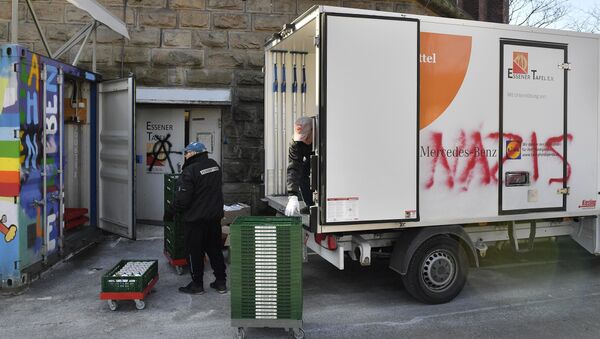A branch of the German food bank Tafel in the northern German city of Essen has resumed giving out free food to foreigners. The charity's chairman Jörg Sartor told the DPA agency, that they would resume the practice, which they'd put on hold in January, by the end of March.
The December decision of the Essen branch to refuse new membership cards to foreigners, thus giving priority to German passport holders, triggered the ire of the political left, who targeted the 930-strong chain this February. A new wave of criticism rose after another Tafel outlet in the western town of Marl followed the example. Apart from a stormy reaction from the management of other German food banks and politicians, who slammed the NGO for xenophobia, doors and delivery vans of organization in Essen have been vandalized with "F*** Nazis" graffiti.
READ MORE: Another German Food Bank Stops Giving Food to 'Young Single Men' and Foreigners
Tafel officials, who referred to the new policy as a “temporary measure” and promised to resume hand-outs before the summer, defended its decision by saying elderly Germans had been scared away from its weekly food distributions. The proportion of foreigners who pick up food from them has risen to 75 percent of the estimated 6,000 people it caters to. Sartor told Deutsche Welle that there had been several complaints about "too much pushing and shoving" during food pick-ups.
The German food charity collects food that is nearing its expiration date from eateries and supermarkets and redistributes it among needy families at a specified time every week. Unemployed and low-income people can take advantage of the social program.
About 1.5 million refugees have arrived in Germany since 2015, prompting local authorities to allocate huge sums for migration-related issues.
The influx of migrants into the country was a result of German Chancellor Angela Merkel's open door policy towards migrants fleeing devastating wars and military conflicts in their home countries in the Middle East and North Africa.




